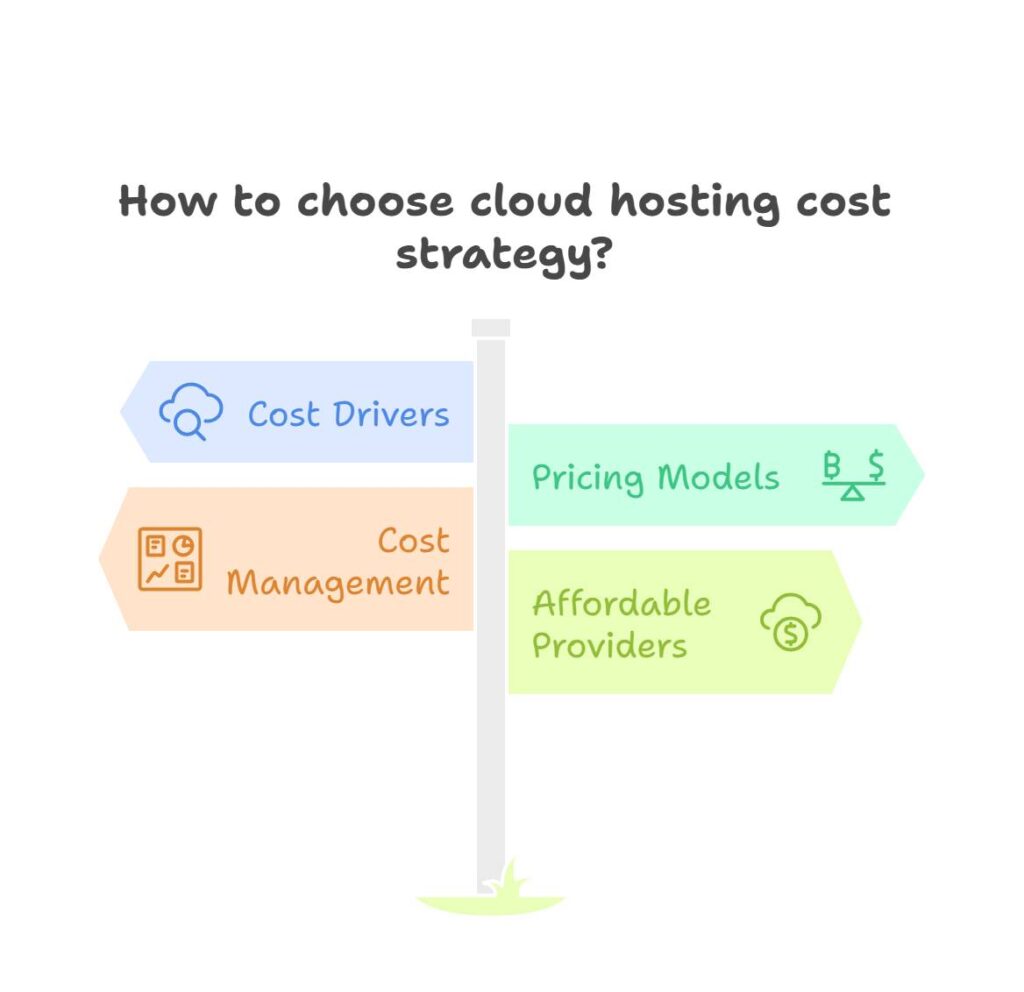Navigating the competitive landscape of cloud hosting can be daunting for businesses seeking cost-effective, high-performance solutions. In today’s fast-paced digital era, discovering cheap cloud hosting services that deliver robust speed, scalability, and reliability is crucial.
This comprehensive guide unpacks cloud hosting costs by exploring key pricing models, essential cost drivers, and top budget-friendly providers. With detailed insights into pay-as-you-go, subscription, and reserved instance plans, you’ll learn actionable strategies to optimize your hosting budget without compromising technical excellence.

Empower your business to harness affordable innovation and secure a competitive edge in the dynamic world of cloud hosting. Start smart, act now.
Understanding Cloud Hosting Costs
Grasping the expenses tied to cloud hosting is vital for folks keeping an eye on their budgets. A bunch of stuff can ramp up the bill, and there’s a mix of pricing setups to fit what you need. So, let’s chat about what drives those prices and lay out the usual pricing game plans.
Factors Affecting Pricing
Here’s what can jack up the cost when using cloud services:
- Types and Amounts of Services: Not all cloud services are made equal in price. Whether you’re dealing with computing power, storage, or databases, the more you use, the more you pay.
- Computing Muscle: More CPU and beefier memory means a steeper bill.
- Data On the Move: How much data you’re pushing in and out of the cloud matters for the price tag.
- Storage Needs: Bigger space demands lead to bigger charges.
Folks looking for a bargain can check out options for cheap cloud hosting services.
Pricing Models Overview
Cloud companies throw out a bunch of pricing styles so you’ve got options depending on how you use it. Knowing these setups can help you not get lost in the dollar shuffle.
1. Pay-as-You-Go (PAYG):
- What’s the Deal?: Only pay for what you actually use. Nice and simple, with no strings attached.
- How You’re Billed: By the hour, minute, or second, usually.
- Perks: Flexibility and you don’t have to throw down cash upfront.
- Best For: Those with ever-changing needs.
- Example: Check out the Google Cloud Platform for a taste.
| Model | Cool Features | Best Suited For |
|---|---|---|
| Pay-as-You-Go | Flexible, no upfront cash | Variable needs |
2. Subscription Plans:
What’s the Deal?: Like a gym membership or streaming subscription, this is set up to pay a flat fee monthly or yearly for a bundle of resources.
How You’re Billed: Fixed price every month or year.
Perks: Makes budgeting simple.
Best For: Small businesses keeping it tight with their spending.
Example: Look at the HostGator Plans.
| Model | Cool Features | Best Suited For |
|---|---|---|
| Subscription-Based | Steady costs | Fixed budget havers |
3. Reserved Instances:
- What’s the Deal?: Lock in capacity for a year or more to score a discount compared to on-demand rates.
- How You’re Billed: Either pay upfront or split it into monthly deals for the time period.
- Perks: Cheaper for tasks you can predict and plan ahead.
- Best For: Businesses with steady work patterns.
Example: Give DigitalOcean and Vultr a peek.
| Model | Cool Features | Best Suited For |
|---|---|---|
| Reserved Instances | Cheaper for the long haul | Predictable tasks |
Picking the right model and keeping an eye on what bumps up the cost can save you some bucks when browsing cheap web hosting services. For more tips, dip into our posts on cheap web hosting with unlimited bandwidth and reliable cheap web hosting.
Cloud Hosting Providers to Consider
Picking the right cloud host can feel like choosing between a burger or pizza—sure, they’re different, but you want the one that’ll hit the spot just right for what you need. Here are a few you might want to check out:
Google Cloud Platform
Google Cloud Platform, or GCP for short, is as flexible as that pair of sweatpants you love. You pay solely for what you use—simple as that. New folks get a sweet $300 in free credits to play with plus over 20 nifty free-tier products.
| Plan Type | Starting Price | Features |
|---|---|---|
| Free Tier | $0 | $300 free credits, limited hot products |
| Pay-as-You-Go | Varies | Use what you need, scale as you go |
Get more scoop on affordable hosting with GCP.
HostGator Plans
HostGator serves up some tasty budgets, starting at $12.95 a month, perfect for bloggers and small bizzes who want their cash to go a smidge further. You get Linux-based reliability and solid performance (PCMag).
| Plan Type | Starting Price | Features |
|---|---|---|
| Hatchling Cloud | $12.95/mo | 2GB RAM, all the data you need |
| Baby Cloud | $13.95/mo | 4GB RAM, and that same generous data offer |
| Business Cloud | $19.95/mo | 6GB RAM, still unlimited data flow |
Look deeper into HostGator plans.
A2 Hosting Offerings
With A2 Hosting, we’re talking $5 a month to start—with SSD storage to boot! They also boost your speed with the optional TurboBoost. Feeling the need for speed yet?
| Plan Type | Starting Price | Features |
|---|---|---|
| Entry | $5/mo | Fast SSD storage, changeable plans |
| Mid | $10/mo | TurboBoost, quicker sites |
| High | $25/mo | Full tweaks, priority love from support |
See A2 Hosting offers for more details.
DreamHost Flexibility
DreamHost stays flexible and gentle on wallets, offering plans good for small to medium bizz sizes. Customizable for whatever operating system you fancy—BSD, Linux, or Windows (PCMag).
| Plan Type | Starting Price | Features |
|---|---|---|
| 512MB RAM Server | $4.50/mo | Modest specs, but still gets the job done |
| 2GB RAM Server | $12/mo | More RAM to play with |
| 8GB RAM Server | $48/mo | Beefy RAM and CPU, pack a punch |
Find out more about DreamHost plans.
Liquid Web Solutions
Liquid Web steps up the price game, but you get some serious muscle for it, starting at $149 monthly. With 15GB of RAM and loads of storage, this is for when you mean business—big time.
| Plan Type | Starting Price | Features |
|---|---|---|
| Basic Cloud | $149/mo | 15GB RAM, oodles of room, huge data |
| Standard Cloud | $349/mo | Twice the RAM and storage |
| Premium Cloud | $1,100+/mo | When you want it all and then some |
Check out Liquid Web solutions.
Vultr Services
Vultr brings things right down to $2.50 per month. They’ve got the speed and easy manageability you crave—think simple, like morning toast (The CTO Club).
| Plan Type | Starting Price | Features |
|---|---|---|
| Basic | $2.50/mo | Half a gig of RAM and a chip of CPU |
| Standard | $5/mo | A whole gig of RAM, still snappy support |
| High Memory | $20/mo | Bulkier RAM, more SSD for your bucks |
Dig into more Vultr services.
Kamatera Packages
Kamatera’s coming in under $5 nearly every month, with a trial and some free credits to test the waters. If you don’t succeed at first, try again, right?
| Plan Type | Starting Price | Features |
|---|---|---|
| Basic | $4/mo | Craft your server machinations |
| Standard | $12/mo | Cool tools like monitoring, backing up your digital world |
| Premium | $50/mo | High-octane performance setups |
Scope out Kamatera’s packages.
Bluehost Cloud Options
Bluehost keeps it cool with entry-level plans starting just below $7 per month—if you’re cool with locking in for 36 months. Good storage, all-you-can-eat data, and no drama (MamboServer).
| Plan Type | Starting Price | Features |
|---|---|---|
| Starter | $6.95/mo | Decent RAM, a solid start for most sites |
| Performance | $8.95/mo | Decent RAM, a solid start for most sites |
| Business | $15.95/mo | The more, the merrier in terms of space and usage |
Learn about Bluehost offerings.
These options roll out a smorgasbord of cloud hosting deals tailored for different vibes and budgets. Whether you’re running a small biz or counting every penny, you now have the info to choose a host that suits your style.
Cloud Hosting vs. Traditional Hosting
Benefits of Cloud Hosting
Cloud hosting throws the spotlight on a bunch of perks perfect for modern-day businesses looking to keep costs down and growth steady. Here’s why cloud hosting might be your go-to:
- Scalability: The cloud is all about being able to stretch or shrink, just like a good pair of elastic sweatpants. It lets you nudge your resources up or down based on what you actually need. No more paying for stuff you don’t use, which is a lifesaver for businesses that see their traffic go up and down like a yo-yo.
- Cost Efficiency: Think of this like your local pay-as-you-go gym subscription—use what you need, pay what you should. This model suits startups and small businesses well because they don’t have to fork out cash for unused resources. It’s a win-win.
- Reliability: Cloud hosting’s got your back with solid uptime promises thanks to its fancy networks and backup systems. That translates to less downtime, so your business doesn’t skip a beat.
- Flexibility: With a buffet of tools and widgets, cloud platforms make it a breeze to throw together, launch, and juggle your apps. This kind of freedom is golden for developers who are involved in diverse tasks.
- Global Reach: Cloud providers with their worldwide data spots help businesses connect with audiences everywhere fast. Say goodbye to delays no matter where anyone’s tuning in from.
Drawbacks of Traditional Hosting
Despite being the old reliable for many, traditional hosting isn’t without its hitches when pitched against cloud hosting.
- Limited Scalability: Traditional plans can feel a bit like shopping from a fixed menu—you get what you see. If you need more slices of the pie, expect to shell out for hardware or pricier plans, which aren’t exactly on-the-fly or cheap.
- Higher Upfront Costs: Expect to invest a chunk initially, thanks to those physical servers taking up space in the office. For fledgling startups, this often feels like a heavy weight on their limited budgets.
- Lack of Flexibility: When it comes to trying out new tech toys or programs, traditional hosting can be annoyingly restrictive. You’re mostly stuck with the programs your host decides to offer.
- Single Point of Failure: Having everything loaded onto one server is like putting all your eggs in one basket. If something goes wrong, you’ll be twiddling your thumbs during downtime unless you cough up for backup arrangements.
| Feature | Cloud Hosting | Traditional Hosting |
|---|---|---|
| Scalability | Sky’s the limit, pay what you use | Stuck unless you crack open your wallet |
| Cost Efficiency | Wallet-friendly—use and pay wisely | Heavy upfront spending |
| Reliability | Strong with backup and networks | Tied to the server’s neighborhood |
| Flexibility | Huge variety of options | Limited to what’s on offer |
| Global Reach | Connect globally, no sweat | Tied to server’s neighborhood |
Sorting through these points can help businesses figure out which hosting road is theirs to travel. Peek into cheap web hosting services or affordable hosting packages for more tips on reliable, budget-friendly choices.
Cloud Hosting Pricing Strategies
When cash is tight, choosing the right cloud hosting plan is crucial. Whether you’re running a small business, freelancing, or just trying to keep your website costs low, picking the right pricing model can save you a ton of cash. Let’s break down some of the go-to options like pay-as-you-go, subscriptions, reserved spots, and gambling on spot prices, so you can make the best choice.
Pay-as-You-Go Model
The pay-as-you-go model (PAYG) is sort of like eating at a buffet — you only pay for what you consume. No long-term contracts, just simple payments for the resources you actually use. Your bill ticks up by the hour, minute, or even second, depending on how you chow down on resources.
Key Nuggets:
- Flexible billing: Only shell out cash for actual use.
- No pre-payments: Forget about paying before you eat.
- Scalability: Ramp up or wind down resources on the fly.
| Resource | Cost per Hour | Cost per Month |
|---|---|---|
| CPU | $0.05 | $36 |
| Memory (GB) | $0.01 | $7.20 |
| Storage (GB) | $0.03 | $21.60 |
Subscription-Based Models
This is like having a season pass— pony up a fixed fee monthly or yearly, and you get a set package of cloud goodies. This model keeps your costs predictable, with no unexpected surprises just like your cable bill.
Key Nuggets:
- Steady costs: Same monthly fee, no surprises.
- All-in-one packages: Extras are often included.
- Easier budgeting: Pay monthly or annually.
| Plan Type | Monthly Cost | Annual Cost |
|---|---|---|
| Basic | $10 | $100 |
| Standard | $30 | $300 |
| Premium | $50 | $500 |
Reserved Instances Approach
For those in it for the long haul, reserved instances let you lock in cloud capacity ahead of time, usually for one to three years. You get juicy discounts in return for committing to the long game, which is perfect if you know exactly how much cloud space you’ll need.
Key Nuggets:
- Save big: Lower costs for committed capacity.
- Ride or die: Commit for 1-3 year terms.
- No surprises: Steady performance for your reserved spots.
| Instance Type | 1-Year Term | 3-Year Term |
|---|---|---|
| Small | $200 | $500 |
| Medium | $400 | $1,000 |
| Large | $800 | $2,000 |
Spot Pricing Dynamics
Spot pricing is a little like playing the stock market—prices dance around based on what’s available. Bid your price and if the stars align, you get awesome deals on unused cloud space. It’s perfect for work that doesn’t mind stopping and starting.
Key Nuggets:
- Prices vary: Changes with demand.
- Wallet-friendly: Potentially snag low prices.
- Perfect for flexible tasks: When interruptions don’t matter.
| Resource | Minimum Bid | Maximum Bid |
|---|---|---|
| CPU | $0.02 | $0.10 |
| Memory (GB) | $0.005 | $0.03 |
| Storage (GB) | $0.01 | $0.05 |
These pricing strategies can help you pick the best budget-friendly web hosting providers. To see more options and get a better grip on costs, check out our guides on the best low-cost web hosting and affordable hosting packages.
Important Considerations for Cloud Hosting
Picking out cheap cloud hosting services is no simple task, as you’ve got to weigh a few significant factors. Think of reliability, performance, and how much bang you’re getting for your buck. Let’s chew over some of these key points, like whether you can beef up your resources when needed, how often your site can take a nap (or should it stay wide awake?), and whether their support team will swoop in when disaster strikes.
Scalability Needs
Being able to expand or shrink your resources is a big deal, especially for small businesses, startups, and those e-commerce folks who dream big. With scalable hosting, you get to stretch your resources to match demand, keeping those bills friendly. This means you shell out cash just for what you actually use. Names like Kamatera spring to mind when considering such flexible options, with plenty of room to play around with RAM, processors, and storage.
| Provider | Starting Price | Scalability Features |
|---|---|---|
| Kamatera | $5/month | Over 100 OS configurations, scalable CPU/RAM/storage |
| Hostinger | $6.83/month | Unlimited server resources, Google Cloud integration |
A good hosting provider lets you roll with the punches, automatically growing to handle sudden surges of traffic—like when your new cat video goes viral. Curious about more scalable options? Check out our guide on affordable hosting packages.
Uptime Guarantees
No one likes a napper, especially when it comes to websites. Uptime is all about keeping your site happy and functional, ready for its 15 minutes of fame—or much longer. Most top-notch hosting services offer pretty decent uptime guarantees tied to these things called Service Level Agreements (SLAs). If you see numbers like 99.9% or more, then they’ve got your back.
| Provider | Uptime Guarantee |
|---|---|
| Kamatera | 99.95% |
| Hostinger | 99.9% |
Make sure to dig into their track record to see how faithful they are when it comes to uptime. Shoot, businessmen and e-commerce pros can’t afford snoring sites, you know? Many options are available in our selection of reliable cheap web hosting providers that can handle the hustle.
Support and Maintenance Levels
No one likes being left high and dry, especially when things go haywire. Having rock-solid support is vital to squash technical headaches fast and keep those interruptions to a bare, boring minimum. Look for hosts that roll out the red carpet when it comes to customer support—around-the-clock, any way you can imagine reaching them and staying on top of maintenance.
Here’s what solid support should include:
- 24/7 live chat and phone support
- Knowledgeable staff who know their way around an online FAQ
- Routine software and hardware check-ups
| Provider | Support Level | Key Features |
|---|---|---|
| Kamatera | 24/7 Support | Live chat, phone support, knowledge base |
| Hostinger | 24/7 Support | Email, live chat, extensive tutorials |
Need specifics on outstanding support? Swing by our article on economically priced web hosting.
So, when you’re hunting for cheap cloud hosting services, weigh up these bits—scalability, uptime promises, and support muscle. They match up with what small biz owners, freelancers, and penny-wise web folks are craving for their investment. Check out more gold picks in our pieces on cheap hosting for bloggers and cheap WordPress hosting providers.
Challenges in Cloud Spending Management
When selecting affordable cloud service providers, keeping a tight grip on spending is essential. Several challenges can pop up, so it’s good to know where the hidden costs are, the best cost-saving methods, and where resources might fall short.
Hidden Expenses
Sometimes, as annoying as it might be, providers sneak in extra costs that can inflate what you’d initially budgeted for cloud services. Think about fees for transferring data, added costs for premium help, and hit-you-when-you’re-not-paying-attention overage charges. Such surprises can make your bill balloon. The key? Know what you’re getting into and read the hosting plan carefully!
| Expense Type | Potential Cost (Monthly) |
|---|---|
| Data Transfer Fees | $0.01 – $0.12 per GB |
| Premium Support | $200 – $300 |
| Overage Charges | Varies (based on usage) |
Optimal Cost Strategies
Businesses often find their cloud expenses outpace their budgets by an average of 15%, with projections to hit 31% within a year. Now, nobody likes math that doesn’t add up! But don’t worry—there are ways to cut down those pesky extra costs. Keeping an eye on utilization, scheduling downtime for non-essential tasks, and using labels to track who’s spending what can save you a pretty penny.
How to keep cloud costs in check:
- Utilization Monitoring: Regularly peek at resource usage; don’t pay for stuff you’re not using.
- Automated Shutdown: Set tools to turn off non-essential stuff when you’re done clocking in for the day.
- Tagging Resources: Snap labels on resources to watch over spending in different parts of your biz.
These techniques help curb costs while still cashing in on the perks of cloud hosting.
Resource Limitations
Plenty of organizations hit a wall due to a shortage of cloud computing whizzes. Since 2017, there’s been a whopping 94% uptick in the need for folks savvy in this field. A gap in skillsets can lead to a cloud mess and rising bills. But all’s not lost! Businesses are snapping up DevOps tools, like Chef and Puppet, to take workload trouble off their hands.
Tackling resource shortages by:
- Training and Development: Pump up the IT skills of your current crew.
- Automation Tools: Lean on DevOps to tidy up cloud management.
- Managed Services: Team up with experienced hosting partners for help (affordable web hosting companies).
By understanding these hurdles and applying savvy solutions, small businesses, startups, and anyone pinching pennies can better reign in their cloud bills. For more tricks on pinching pennies with cloud hosting, check out the best low-cost web hosting services and cheap hosting with free domain packages.
Trends in Cloud Hosting
As cloud hosting morphs at the speed of light, keeping a finger on the pulse of the latest trends is vital for small businesses, startups, and penny-pinching website owners. Let’s cut to the chase—there are three biggies in the game right now: growth like nobody’s business, the wallet-busting costs, and that security thing we all freak out about.
Growth in Sector Value
Hold onto your hats, the cloud sector is booming! Sitting pretty at more than USD 602.31 billion, and climbing with a swagger of 15.7% CAGR till 2030. This rocket ride is fueled by folks falling head over heels for those scalable, money-friendly cloud hosting services. It’s like everyone’s hopping on the bandwagon because, let’s face it, the cloud’s got the goods and is set to keep cashing in.
Cost Burdens on Companies
Sure, the cloud’s all glitz and glamour, but it doesn’t come cheap. Money talk time—cloud spending is a monster to tame. Flexera’s State of the Cloud Survey dishes the dirt that spending in the cloud eats up cash faster than Houdini made things disappear. They heard from a whopping 750 cloud techies, and guess what topped the worry chart? Yep, dollars and cents.
Turns out, businesses are burning up an average of 15% more than planned, and they expect it to jump to a jaw-dropping 31% soon. What to do? They’re playing smart with tricks like monitoring the lights, pulling the plug when no one’s around, and tagging like it’s the coolest new social media trend.
| Cloud Spending Dramas | Percentage over Budget |
|---|---|
| Current Overspend | 15% |
| Future Headache | 31% |
Focus on Cybersecurity
If the word ‘cybersecurity’ isn’t ringing alarm bells, it probably should be. A whopping 93% of the top dogs—think big companies in all corners of the economy—are one step away from a panic button over scary cloud data breaches. Cyber woes are set to pickpocket businesses to the tune of $10.5 trillion by 2025.
So, if you’re dabbling with cheap cloud hosting, you better lock down the digital hatches. Go hard or go home with top-notch security, regular checkups, and solid support to dodge those nasty breaches.
By getting cozy with these trends, small biz folks, startup whizz-kids, and budget-savvy site owners can slickly choose affordable hosting packages. For more hacks on making the cloud work for you, nosedive into our guide on cheap web hosting services and explore cheap web hosting with site builder.
Comparison of Affordable Cloud Hosting Providers
Finding budget-friendly cloud hosting doesn’t mean you have to sacrifice quality. We’ve rounded up some solid options for small businesses, startups, and freelancers who want the best bang for their buck. Let’s see how Kamatera, Bluehost, ScalaHosting, Hostinger, DigitalOcean, Vultr, InterServer, and AccuWebHosting stack up.
Kamatera and Bluehost
Kamatera
Kamatera starts off the game strong with flexible cloud hosting packages, kicking off at just $4 a month. They sweeten the deal with a free 30-day trial, giving you a chance to test the waters without splashing any cash.
Bluehost
With Bluehost, you’re looking at starting costs of $6.95 monthly if you commit to a 36-month term. They throw in 40 GB of storage and all-you-can-eat bandwidth, along with some tasty features like data redundancy and integrated caching.
| Provider | Starting Price (Monthly) | Storage | Bandwidth | Extra Goodies |
|---|---|---|---|---|
| Kamatera | $4 | Custom | Custom | 30-day trial |
| Bluehost | $6.95 (36-month term) | 40 GB | Unmetered | Data redundancy, caching |
ScalaHosting and Hostinger
ScalaHosting
ScalaHosting gives you a buffet of scalable cloud hosting plans without breaking the bank. They cater to both solo flyers and businesses.
Hostinger
Known for affordability, Hostinger’s plans are perfect for the small guys—think small businesses or beginners. They package their deals with email accounts, SSL certificates, and, you guessed it, 24/7 support.
| Provider | Starting Cost (Monthly) | Storage | Bandwidth | Goodies |
|---|---|---|---|---|
| ScalaHosting | Competitive Rates | Custom | Custom | Scalable plans |
| Hostinger | Budget Rates | Varies | Varies | Email, SSL, 24/7 help |
DigitalOcean and Vultr
DigitalOcean
DigitalOcean starts low at $5 a month, offering flexibility with both hourly and monthly billing. Their SSD storage and servers are ready to go at a moment’s notice. (GoogieHost)
Vultr
Vultr greets you with a $50 credit on sign-up. With an easy interface and one-click installs, their packages come with SSDs that promise to keep things zipping along.
| Provider | Starting Price (Monthly) | Storage | Bandwidth | Goodies |
|---|---|---|---|---|
| DigitalOcean | $5 | SSD | Varies | Quick setup |
| Vultr | Free trials | 100% SSD | Varies | $50 credit |
Kamatera and HostGator
Kamatera
Kamatera doesn’t quit at $4 a month, letting you fine-tune your resources to fit like a glove. And yes, the 30-day free trial is still in play.
HostGator
HostGator matches affordability with reliability, making sure mid-sized businesses have high uptime and easy scalability. Customer support is there for you, rain or shine.
| Provider | Starting Price (Monthly) | Storage | Bandwidth | Perks |
|---|---|---|---|---|
| Kamatera | $4 | Custom | Custom | 30-day trial |
| HostGator | Low Cost | Varies | Varies | Excellent uptime |
InterServer and AccuWebHosting
InterServer
InterServer keeps it real at $6 a month. If you’re new, the first month’s basically a gift at $0.01 with a nifty coupon. Throw in some customization and you’re golden.
AccuWebHosting
AccuWebHosting solves your woes with pocket-friendly plans, tailor-made for budding businesses and projects that need dependable performance without a heavy price tag.
| Provider | Starting Price (Monthly) | Storage | Bandwidth | Bonuses |
|---|---|---|---|---|
| InterServer | $6 | Custom | Custom | $0.01 first month |
| AccuWebHosting | Budget-friendly | Varies | Varies | Steady performance |
These budget-friendly providers will ensure that small business owners, freelancers, and budget watchers find the right cloud hosting without emptying their wallets. They balance costs, storage options, and nifty benefits to suit various needs and projects.
Conclusion
In conclusion, understanding the complex landscape of cloud hosting is key to unlocking cost-effective, high-performance digital solutions. This comprehensive guide has explored various pricing models—pay-as-you-go, subscription-based, reserved instances, and spot pricing—to illustrate how each impacts your overall budget.
Critical factors such as computing power, data transfer rates, and storage requirements significantly affect costs and must be carefully considered when selecting a provider.
Detailed comparisons of top providers like Google Cloud Platform, HostGator, A2 Hosting, and others underscore the need for scalable, reliable, and supportive hosting solutions.
Implementing effective cost management strategies, including resource monitoring, automation, and proper tagging, empowers businesses to optimize cloud spending without compromising performance. As the cloud hosting landscape evolves rapidly, staying informed and leveraging these insights will ensure your infrastructure remains agile, secure, and future-ready.
By proactively adjusting your hosting strategy and staying ahead of emerging trends, you can ensure long-term success and operational efficiency.
FAQs
What is cloud hosting?
Cloud hosting is a model where your website is hosted on a network of interconnected servers, offering enhanced scalability, reliability, and flexibility compared to traditional hosting solutions.
How do different pricing models affect my costs?
Pricing models—such as pay-as-you-go, subscription, reserved instances, and spot pricing—determine how you are billed based on actual resource usage, commitment levels, and market demand fluctuations.
What factors should I consider when choosing a cloud hosting provider?
Evaluate factors like scalability, uptime guarantees, support quality, computing power, data transfer limits, and storage capabilities to ensure the provider meets your technical and budgetary requirements.
Technical Best Practices
- Monitor Resource Usage: Continuously track CPU, memory, and storage to avoid over-provisioning.
- Automate Scaling: Use auto-scaling tools to adjust resources based on real-time demand.
- Tag and Track Costs: Implement tagging to monitor spending across different projects or departments.
- Review SLAs: Regularly assess uptime and support guarantees to ensure reliability.
- Optimize Configurations: Fine-tune server configurations to match your exact workload requirements.
- Invest in Security: Prioritize robust cybersecurity measures and regular backups.
Recommended Hosting Tools & Solutions
- Cloud Cost Management:
- AWS Cost Explorer
- Google Cloud Pricing Calculator
- Cloudability
- Monitoring & Automation:
- DigitalOcean Monitoring Tools
- HostGator Control Panel Tools
- A2 Hosting Turbo Tools
- DevOps & Configuration Management:
- Chef & Puppet
- Kubernetes for container orchestration
- Additional Solutions:
- Vultr Management Interface
- Kamatera Customization Options
- Third-Party Tools like ParkMyCloud
This article has provided a deep dive into affordable cloud hosting, breaking down cost drivers, pricing models, and critical provider comparisons.
By exploring technical factors such as computing power, data transfer, and storage, we’ve highlighted the benefits of flexible pricing—whether via pay-as-you-go, subscription, or reserved instances. Emphasis on effective cost management and strategic resource allocation enables businesses to harness the full potential of cloud hosting without overspending.
Leveraging expert insights and actionable strategies, readers are now equipped to select the best budget-friendly hosting solution that delivers reliability, scalability, and technical excellence in today’s competitive digital landscape.





